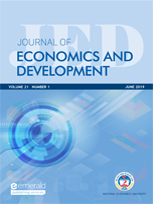Impact of credit rationing on capital allocated to inputs used by rice farmers in the Mekong River Delta, Vietnam
Keywords:
Credit rationing, Propensity score matching, Input, Mekong River Delta, Probit, Rice farmer
Abstract
PurposeThe purpose of this paper is to estimate the impact of credit rationing on the amount of capital allocated to inputs used by rice farmers in the Mekong River Delta (MRD).
Design/methodology/approach
Based on the literature review, the authors propose nine hypotheses on the determinants of access of rice farmers to credit and four hypotheses on the impact of credit rationing on the amount of capital allocated to inputs used by rice farmers in the MRD. Data were collected from 1,168 farmer households randomly selected out of 10 provinces (city) in the MRD.
Findings
Step 1 of propensity score matching (PSM) with probit regression shows that land value, income, education, gender of household head and geographical distance to the nearest credit institution affect the degree of credit rationing facing rice farmers. Step 2 of PSM estimator identifies that the amount of capital allocated to inputs such as fertilizer and hired labour increases when credit rationing decreases while that allocated to seed and pesticide is not influenced by credit rationing because rice farmers use these inputs adamantly regardless of effectiveness.
Originality/value
This paper sheds light on the impact of credit rationing on the amount of capital allocated to inputs used by rice farmers, which is largely different from the main focus of the extant literature just on the determinants of credit rationing facing farmers in general and rice farmers in particular.

